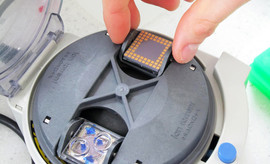PrediLife and Institut Curie Announce Collaboration to Conduct Genetic Analyzes of Next Generation MammoRisk Breast Cancer Risk Prediction Test

PrediLife (Euronext Growth Paris: ALPRE), a company developing innovative pathology risk prediction solutions for personalized medicine, announces its collaboration with Institut Curie in the launch of the new generation of MammoRisk®, a prediction test breast cancer risk that now incorporates a polygenic score from a salivary test.
Breast cancer: second leading cause of death in women worldwide
Breast cancer, the world's second most common cancer with 2.1 million new cases a year, is responsible for more than 620,000 annual deaths. The current widespread screening set up in many countries represents a major advance in public health but has certain limitations: programmed from the age of 50, risk of over-diagnosis, the problem of cancers developing between two mammograms, false positives ... This finding emphasizes the need to integrate new screening programs into current screening programs.
MammoRisk ®: a test for predicting and preventing the risk of breast cancer
Designed to be prescribed by physicians, MammoRisk ® is a breast cancer risk prediction test complementary to mammography that integrates 5 risk factors: the age of the woman; breast density; the number of family history (0, 1, or +); a history of mammary biopsy and a polygenic score calculated from the latest scientific publications. This score is the result of the analysis of hundreds of thousands of point variations of the genome or polymorphisms or even SNPs (polymorphism of a single nucleotide). These frequent variations in the general population are polymorphisms. Some of these polymorphisms have been associated with an increased risk of breast cancer. Taken one by one, these polymorphisms have a weak impact; however, some of their combinations have a significant impact on breast cancer risk, comparable to other recognized factors such as breast density or first degree family history.
An ambitious collaboration
The collaboration between PrediLife and the Institut Curie will initially allow the study of a hundred or so polymorphisms associated with an over-risk of breast cancer, the Institut Curie performing the genetic analyzes integrated into the MammoRisk ® score. a second step, Predilife and Institut Curie will develop research projects capitalizing on the complementarity of Institut Curie's expertise in breast cancer, the first European center for the care of women with cancer, and Predilife's ability to develop and market these tests.
For Dominique Stoppa Lyonnet, Head of the Genetics Department of the Institut Curie and Professor at the University Paris-Descartes
The approach proposed by Predilife incorporating various factors and in particular the combination of SNPs is interesting, including women with inherited genetic predisposition (eg BRCA1, BRCA2). The goal of this collaboration is to carry out part of the MammoRisk ® test and ultimately accelerate the research projects of the Institut Curie's Genetics Department already in progress in this field.
David Gentien, head of the Institut Curie genomics platform says:
This collaboration underscores the capacity of Institut Curie's genomics platform to provide academic and industrial partners such as Predilife with technological tools for high throughput genomic analysis.
Stéphane Ragusa, Founder and Chief Executive Officer of PrediLife commented:
We are very pleased with this collaboration with Institut Curie, one of the world's leading cancer control centers. This partnership validates the reliability of our breast cancer risk prediction solution. With the genetic component that we have integrated, MammoRisk® becomes the only available test that takes into account the three pillars necessary for a reliable and personalized prediction of the risks of breast cancer, in the general population: clinical data, density mammary, and genetic polymorphisms.
Amaury Martin, Head of Technology Transfer and Industrial Partnerships Office of the Institut Curie and Director of the Carnot Curie Cancer Institute concludes:
This agreement is a good example of the integrated strategy implemented at the Institut Curie to involve both clinicians , researchers and partner companies in a logic of co-development. This demonstrates the attractiveness of the Institut Carnot label for the development of partnership research and strengthens the Institut Curie's position as a reference player in the development and use of new technologies to improve patient care .



